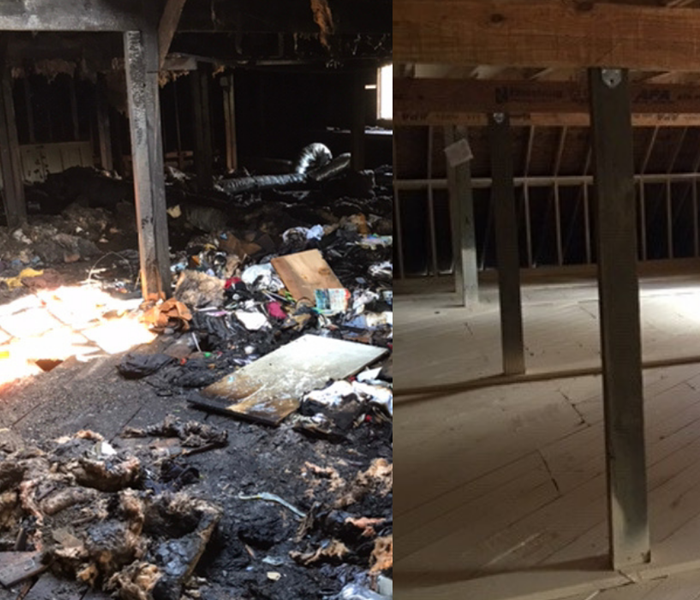How Smoke Odors Affect Your Home
9/11/2023 (Permalink)
If you’ve ever sat around a campfire, you know that the smoke odor clings to everything. Your clothes, belongings, and even your hair, can smell like campfire smoke for days afterward. The same is true in the unfortunate event that your home or business experiences a fire. These particles coat your walls and belongings and everything else the smoke touches leaving a residue and foul odor behind that’s difficult to get rid of. In order to understand these odors and how to fix them, it’s important to first understand what smoke really is and how it’s created during a fire.
All of the items in your home are made up of various compounds, some are flammable, and some are not. For example, in a piece of wood, you’ll find water, cellulose, carbon, and other minerals, and volatile organic compounds or hydrocarbons (a compound is “volatile” if it evaporates when heated). Smoke happens when there is incomplete combustion of a fuel source. When there is complete combustion, everything is burned and these hydrocarbons are converted into water and carbon dioxide, but in incomplete combustion, not all of the particles are burned. Visible smoke is a collection of these unburned particles in various forms. Ash is also another by-product of fires and consists of non-flammable minerals that do not burn.
When these hydrocarbons in the items in your home are evaporating and turning into a gas (smoke) these microscopic particles are spread all over the house through the air. This smoke can also carry tiny solid (carbon/soot) and liquid particles from the burning materials as well. As it travels through your home these particles are left behind on your belongings and everything else the smoke comes in contact with. Some of these compounds left behind include the nasty odor-causing particles that we perceive as smells.
Depending on the fuel sources (wood, protein, plastic, etc.) the compounds that make up these smoke particles will be different and will change what’s left behind, how it needs to be cleaned up, and how it smells. For example, wood fires often create a powdery dry smoke that’s easier to clean up visually, but the particles are small and can easily settle into porous materials making the smells linger even after the house “looks” clean. Plastic fires often create a “wet” smoke that carries extremely sticky particles that are very difficult to clean.
Getting rid of smoke odors can often be a whole separate task on its own from cleaning up the smoke damage like soot and stains, which often requires special cleaners or equipment like ozone or hydroxyl generators. This equipment releases radicals in the air that can bond to the odor particles causing them to fall from the air due to the added weight where they can be cleaned easier or help decompose them and neutralize the smells.
As you can see, there’s a lot more going on in smoke and the odors it creates than meets the eye. Here at SERVPRO, our technicians are constantly trained to use the latest techniques and equipment in fire and smoke damage restoration to help ensure that we can get your home or business back in order in the most efficient and effective way possible. Remember that the longer the longer these smoke particles sit on your belongings the harder it will be to fully get rid of them and the more damage they can cause! We’re available for emergency services 24/, 365 days a year so please give us a call and let us know what we can do for you.






 24/7 Emergency Service
24/7 Emergency Service
